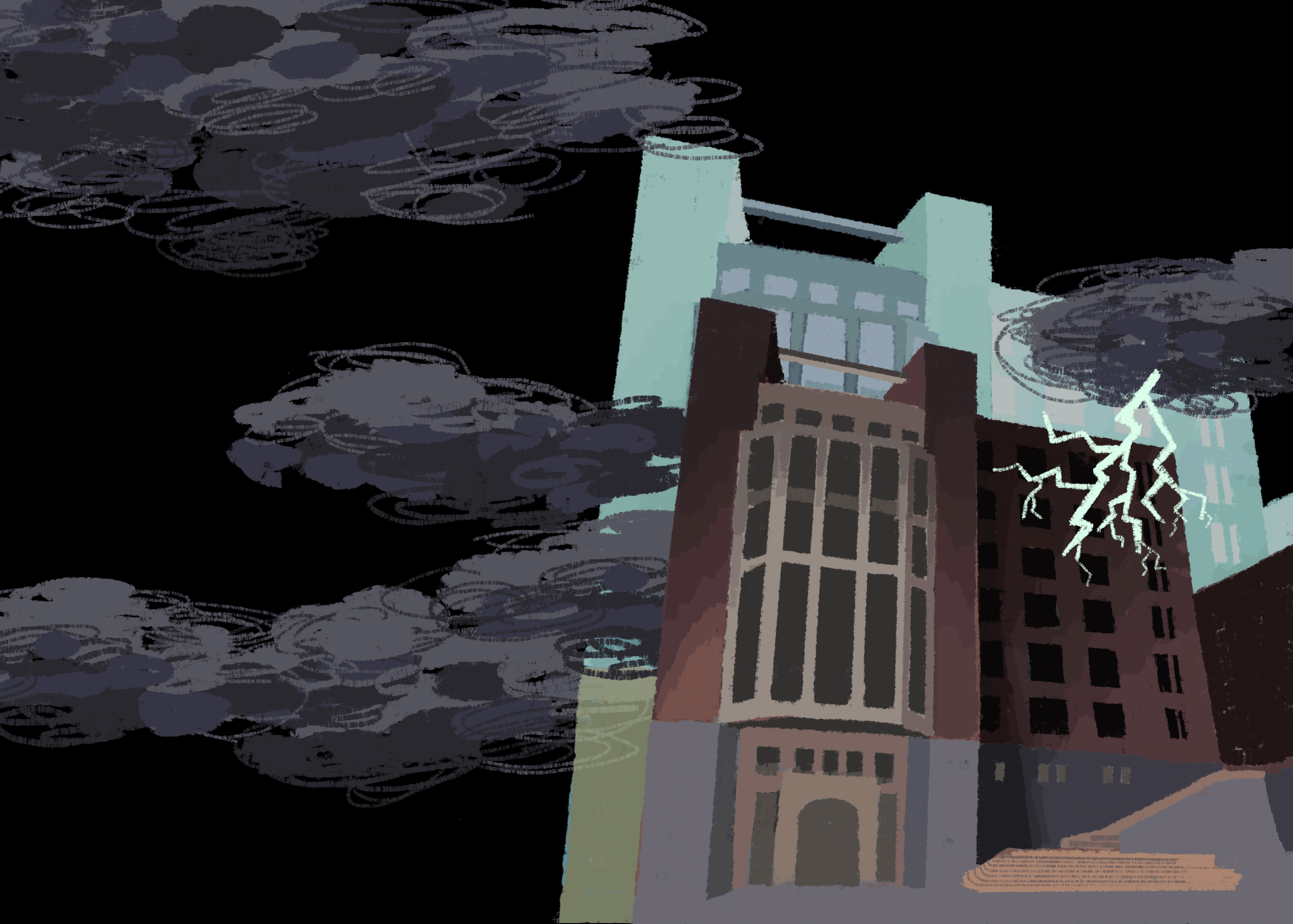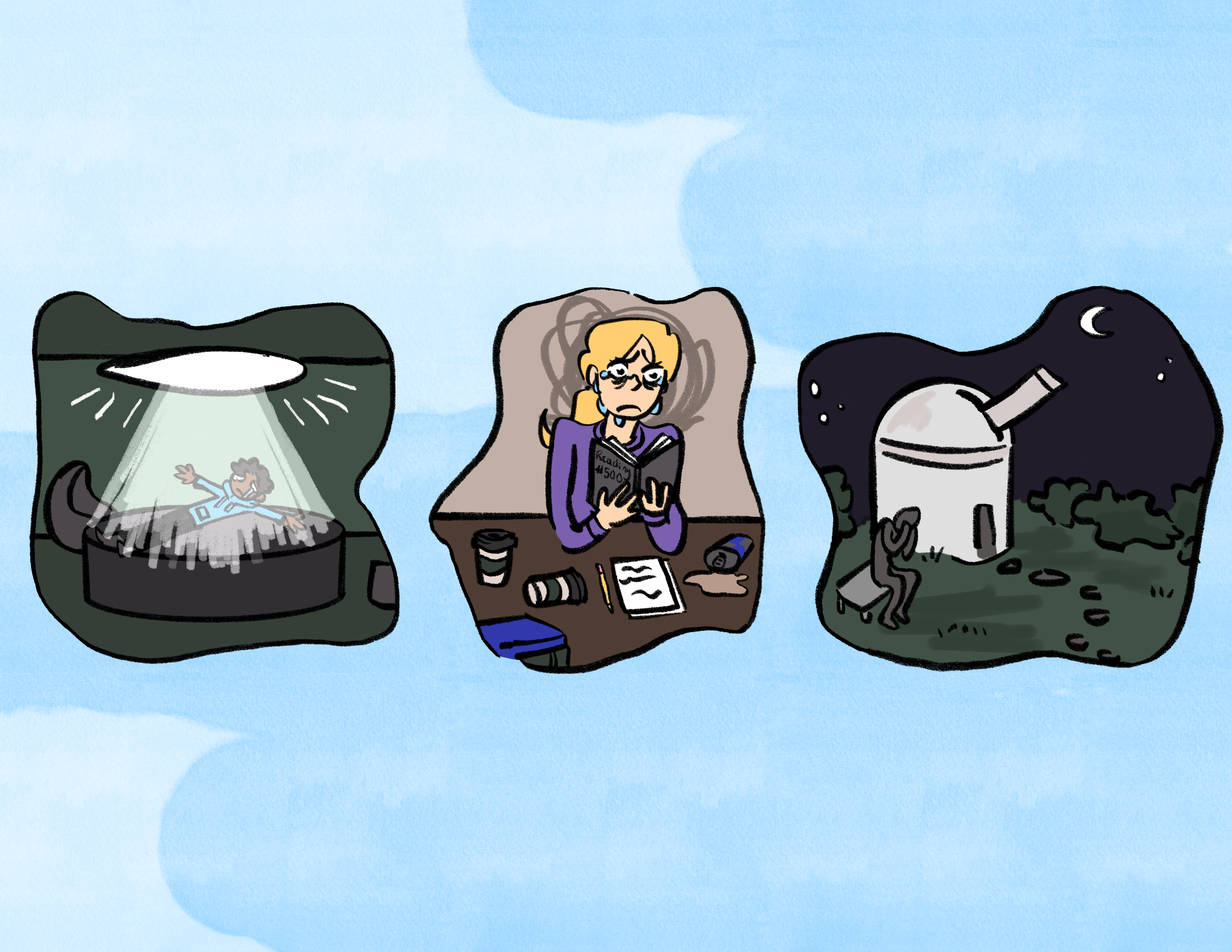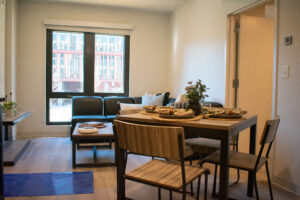Byrnes, Hayden, & Henle Halls—known to students as “New Henle”—became a dream dorm when housing registration opened for the 2025-26 school year last spring. Now, unexpected maintenance issues have raised concern among some living there.
The former Henle Village was demolished in June 2023. After almost two years of construction, constant drilling, and blocked pathways, the new complex houses three residential buildings: Byrnes, Hayden, and Henle Halls.
Depending on the layout and number of roommates, living in one of these residence halls can cost between $9,266 to $10,250 a semester, making them more expensive to live in than any Georgetown housing beyond a renovated townhouse. The construction added 200 beds, so the three buildings now have the capacity to accommodate 730 residents.
Since its opening, the complex has been abuzz with movement. The Healey Family Student Center inspired the building’s first-floor community spaces, where students can lounge, study, and socialize. Byrnes Hall includes a game room featuring foosball and billiards tables. The complex also includes spaces for meditation and movement, along with traditional study rooms.
At the beginning of the 2025-26 school year, many students were thrilled to move into New Henle’s apartment-style living, complete with in-unit washers and dryers.
“My first impression was, ‘I love it,’ because we’re high up and on the corner, and so we have so many windows, so much natural light; it’s really gorgeous,” said Lucie Talikoff (CAS ’27), who lives in Byrnes Hall with three seniors.
However, New Henle’s charm came with unexpected issues for some residents.
“I feel very lucky to be in this dorm,” Talikoff said. “That said, you do notice that they put it together quickly.”
The residential halls have faced significant problems, including access to electricity and hot water, students said, affecting their everyday lives.
“There are a lot of electrical issues throughout the building. We’re not the only ones who’ve experienced that,” Talikoff said. “Every once in a while, we’ll have to go reset all the breakers for certain appliances because the fridge will stop working, or the microwave, or some outlets.”
Residents have also noticed long wait times for maintenance. When Talikoff’s sink cracked in half, it took more than two weeks to get it fixed.
Beyond the electrical issues, the “touch-and-go” plumbing has also made New Henle a challenging place to live, Talikoff said. The complex has faced hot water shortages this semester, according to emails sent to residents.
Anjali Lauwers (MSB ’26), a Hayden Hall resident, said her hot water system was broken for a month. Lauwers and her roommates could only use hot water for short periods of time, she said.
A university spokesperson told the Voice that the residence halls’ novelty has added layers to addressing maintenance issues, as the infrastructure and amenities are still under warranty. The three residence halls are temporarily operating on a process that is “different from [the] normal maintenance request process for residential buildings.”
“We recognize that while living in a new building has many advantages, these warranty issues and associated timelines may be frustrating,” the spokesperson wrote. “We appreciate students’ understanding and patience as we navigate this first year together.”
The spokesperson added that Planning and Facilities Management is actively working with the buildings’ contractors to address “any unexpected maintenance issues.”
Beyond issues with maintenance, some residents said that the space hasn’t been as conducive to community-building as they had imagined. New Henle has spacious common spaces on each floor, including outdoor terraces on the second and eighth floors. Yet, some students have found that these spaces are rarely used.
“It feels a little bit more fragmented compared to some of the other dorms on campus, and I think that’s just kind of the nature of being in an apartment complex,” Lauwers said. “People kind of tend to stay within their own units, stay with their own friends, rather than gathering around with the people around them.”
Some residents have also raised concerns about their apartment’s layout and design. Olivia Booth (CAS ’26), who moved out of her Henle apartment, said that not every bed space in Henle has a window due to the “double privacy” room design. This design places a bathroom in the middle of the room in order to give roommates more private space, but Booth found that the bathroom limited natural lighting on her side of the room.
“It’s just obvious that Georgetown designed it in a way to save money at the expense of students’ daily functioning and mental health,” Booth said. “It just feels like Georgetown really did not care about the students’ lives.”
A university spokesperson said that the residential halls all follow D.C. Housing and Safety codes.
“The safety, health, and well-being of our students is our highest priority,” the university spokesperson wrote. “We work through every maintenance request as diligently and expeditiously as possible.”
Despite these concerns, many New Henle residents remain happy with their housing choice.
“Honestly, there are a few little annoying things that you need to expect are going to happen several times a semester, but it doesn’t come close to the benefits in my book,” Talikoff said.







